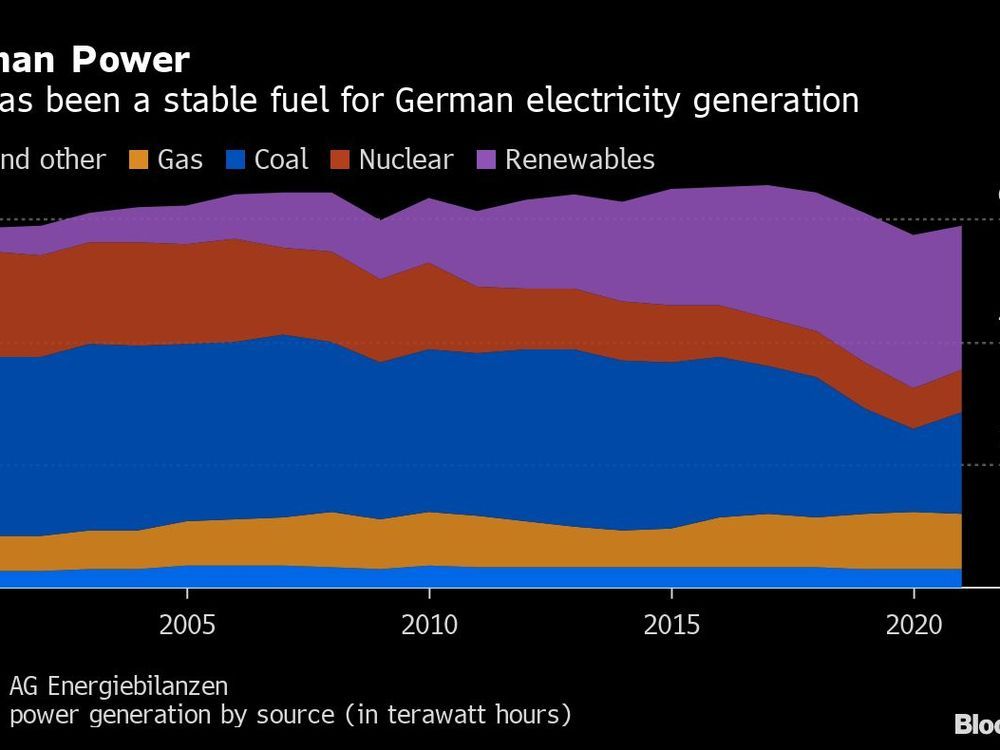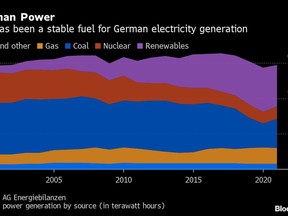Article content
(Bloomberg) —

[ad_1]
(Bloomberg) —
Author of the article:
Bloomberg News
Vanessa Dezem and Birgit Jennen
Publishing date:
Aug 21, 2022 • 14 minutes ago • 3 minute read • Join the conversation

(Bloomberg) —
This advertisement has not loaded yet, but your article continues below.
Germany may not be able to replace all its imports of Russian natural gas this winter and might have to resort to nuclear power to plug part of the gap, the nation’s two most powerful leaders said.
Europe is in the middle of its worst energy crisis for decades, which has fueled inflation and put nations at the brink of a recession. That’s forcing politicians to look at all alternatives available, including atomic energy, a technology Germany had decided to exit permanently by the end of the year.
Speaking at a government open day in Berlin on Sunday, both Chancellor Olaf Scholz and Economy Minister Robert Habeck emphasized that while there’s an option of extending the lives of the nation’s three last reactors beyond December, it’s only under consideration because of the increasing worries that Europe’s biggest economy won’t be able to replace dwindling natural gas supplies from Russia.
This advertisement has not loaded yet, but your article continues below.
While it’s not the first time the government has mooted the possibility of relying on nuclear for longer than planned, such comments are getting gradually stronger. At the same time, the technology is not the most economical, nor the safest available for Germany, Habeck said. Scholz pointed at the maintenance and repair issues in France as a pointed reminder of the problems older plants are facing.
“What worries me is that there is no ready answer to the question of what happens when gas runs out,” Scholz said. “If we were to make the decision to keep them running so that we make sure we don’t have a problem this winter, then it will only make a small contribution to solving our challenge, because it is only about electricity production.”
This advertisement has not loaded yet, but your article continues below.
EON Open to Talks on Extending Life of German Nuclear Plant
The operators, including EON SE and RWE AG, have said that they are open to discussing such an option with lawmakers, but stressed the need for a swift decision. A study on security of supply that will help Germany to decide on the nuclear plants will be available by the end of the month or early September, Scholz said.
By contrast, German Finance Minister Christian Lindner was more bullish on the prospect of extending the lives of the reactors on a temporary basis. “There’s a lot to be said to use the three nuclear power plants that we have,” he said at the open day.
In the short term, reducing energy demand will make the biggest difference for Germany and all other nations pivoting away from Russian supplies.
This advertisement has not loaded yet, but your article continues below.
Germany has urged citizens to lower their consumption and last week slapped a levy on gas use. It also seeks to bring back coal power plants that were being removed from the system and is investing in infrastructure to import more liquefied natural gas.
Gas stores are 78% full, according to the latest data from the Federal Network Agency, the country’s energy regulator.
“There is no scenario in which there is no gas, but there is a scenario in which there is not enough gas in storage, and supplies in other forms are not not so available as they were,” said Habeck. “The question is how big is the gap in the worst case. There is a gap and that is the real question.”
About 60% of Germans are in favor of extending the life of the remaining nuclear power plants in Germany, according to an Allensbach poll for Frankfurter Allgemeine Zeitung published on Sunday.
Those reactors might displace just 3% of German natural gas consumption next year, Kesavarthiniy Savarimuthu, an analyst at BloombergNEF, said in a report earlier this month.
“As much as I think it is wrong to go into nuclear power, I have to face that question. It is complex,” said Habeck.
(Updates with Scholz comment in fifth paragraph.)
This advertisement has not loaded yet, but your article continues below.
Sign up to receive the daily top stories from the Financial Post, a division of Postmedia Network Inc.
A welcome email is on its way. If you don’t see it, please check your junk folder.
The next issue of Financial Post Top Stories will soon be in your inbox.
We encountered an issue signing you up. Please try again
[ad_2]
Image and article originally from financialpost.com. Read the original article here.